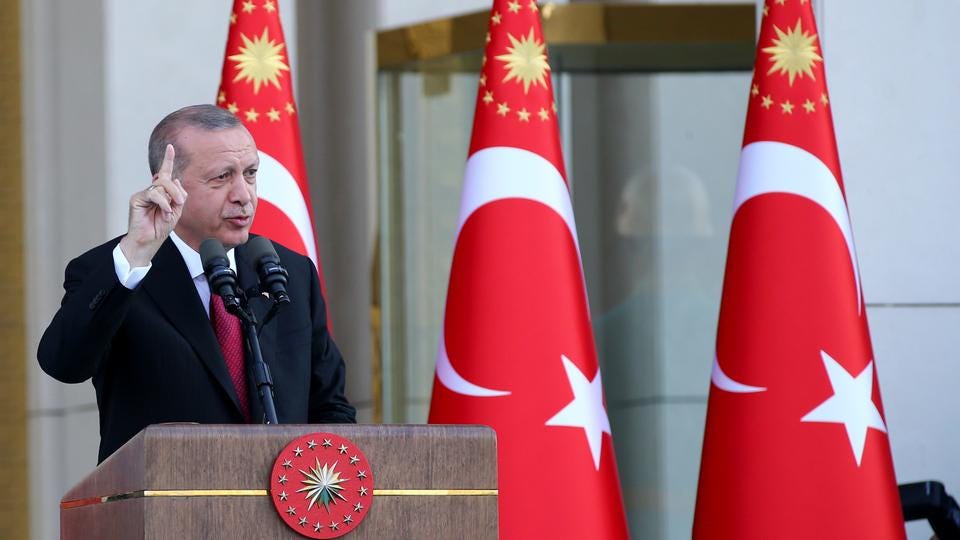Emerging Markets Daily - December 20
Leftist Wins Presidency in Chile, Typhoon Batters SE Asia, Turkish Lira Resumes Slide, India's Razorpay Hits $7.5B Value, Stocks and Oil Fall on Omicron Fears
The Top 5 Stories Shaping Emerging Markets from Global Media - December 20
Leftist Wins Historic Election in Chile, Vows to Remake the Country
World’s largest copper-producing nation turns left
CNBC
“Former leftist student leader Gabriel Boric will be under quick pressure from his youthful supporters to fulfill his promises to remake Chile after the millennial politician scored a historic victory in the country’s presidential runoff election.”
“Boric spent months traversing up and down Chile vowing to bring a youth-led form of inclusive government to attack nagging poverty and inequality that he said are the unacceptable underbelly of a free market model imposed decades ago by the dictatorship of Gen. Augusto Pinochet.”
“The bold promise paid off. With 56% of the votes, Boric on Sunday handily defeated his opponent, far-right lawmaker José Antonio Kast, by more than 10 points and at age 35 was elected Chile’s youngest modern president.”
“Amid a crush of supporters in downtown Santiago, Boric vaulted atop a metal barricade to reach the stage where he initiated in the indigenous Mapuche language a rousing victory speech to thousands of mostly young people…”
“In his speech, the bearded, bespectacled president-elect highlighted the progressive positions that launched his improbable campaign, including a promise to fight climate change by blocking a proposed mining project in what is the world’s largest copper producing nation.” CNBC reports.
Severe Weather Batters Southeast Asia, Shuts Down Ports and Hits Businesses
Bloomberg
“Severe weather disruptions hit Malaysia and the Philippines, leaving a trail of destruction among nations most prone to natural disasters.”
“Typhoon Rai, a super typhoon before slamming into the Philippines on Thursday, left 208 dead along its path. More than 440,000 people were displaced, with about a million affected, Mark Timbal, spokesman of the National Disaster Risk Reduction and Management Council, said on Monday.”
“Across peninsular Malaysia, a weekend of torrential rain displaced more than 61,000 people, shuttered roads and disrupted shipping…Cargo delivery and vessel berthing at Malaysia’s Port Klang, Southeast Asia’s second-biggest port, will be delayed as access roads are damaged and workers have not been able to get to work, authorities said Saturday.”
“The disruption comes days after Intel Corp. unveiled a $7.1 billion investment in Malaysia and said it expects the global chip shortage to last until 2023. The country is a major chip testing and electronics hub, and delays in shipments could add to the supply-chain snarls that have battered the world economy.”
“Netherland’s BE Semiconductor Industries NV cut its fourth-quarter revenue outlook on Monday due to flooding affecting its Shah Alam facility in Malaysia. The company said revenue may drop 15% to 20% sequentially, exceeding the previous guidance for a 5% to 15% decrease…”
“Annual economic loss due to disasters in Southeast Asia is estimated at $86.5 billion, according to a 2020 United Nations Economic and Social Commission for Asia and the Pacific report.” Bloomberg reports.
Turkish Lira Resumes Slide as Erdogan Doubles Down on Rate Cuts Pledge
“There is no going back,” Erdogan says.
Financial Times
“The Turkish lira continued its freefall after President Recep Tayyip Erdogan rejected warnings from business about the dangers of recent interest rate cuts and vowed there was ‘no going back’ from his approach. The currency, which has lost 50 per cent of its value against the dollar since Erdogan ordered the central bank to start lowering borrowing costs in September, fell to a new record low of 18 against the dollar on Monday.”
“The lira’s 9 per cent fall was much worse than the 0.2 per cent dip for MSCI’s broad emerging market currencies index. In a sign of growing concern about the fallout from the plunging currency on the health of the broader financial system, the cost of protecting against a default on Turkish debt has climbed sharply.”
“The spread on the five-year credit default swap has risen to 600 basis points, from about 300bp at the start of the year, according to IHS Markit data collated by Refinitiv. Trading on Turkey’s main stock exchange was halted for the second consecutive session following a 5 per cent decline for the flagship index…”
“In his remarks on Sunday night, Erdogan acknowledged public concerns about soaring prices but painted the problems as temporary — and cast them as part of a national struggle for economic independence. ‘Of course we know that price rises are causing problems in the daily lives of our people. Of course we are aware of the volatility in the exchange rate, the instability in prices and the uncertainty this creates,’ he said. ‘But we will resist these just as we resisted tutelage, terrorist organisations, putschists and global power barons. I am telling you, there is no going back.’”
India’s Razorpay Hits $7.5 Billion Valuation
“Razorpay, which offers payment processing and digital banking services to businesses, has raised $375 million in a funding round led by Lone Pine Capital, Alkeon Capital and TCV, signaling heightened investor interest for Indian fintech startups.”
“Existing investors Tiger Global, Sequoia Capital, GIC and Y-Combinator also participated in the round, valuing Razorpay at $7.5 billion, the company said in a statement on Monday. The valuation is up sevenfold since October 2020, when it breached $1 billion…”
“The startup is among the few business-to-business (B2B) fintechs that have entrenched themselves in the small businesses segment. In India, fintech is dominated by consumer-facing startups that offer everything from peer-to-peer payments and loans to wealth management services.”
“India is home to about 63 million small businesses that are gradually embracing digitization in the wake of the pandemic. ‘India's B2B fintech sector is undergoing a period of rapid growth,’ David Craver, co-chief investment officer at Lone Pine Capital, said in a statement, ‘and we are excited to partner with Razorpay, which has been at the forefront of creating resilient, innovative products to anticipate and address the changing needs of businesses.’”
“Razorpay, which was founded in 2014 as a payment processing company, says it facilitated $60 billion worth of payments in 2021. Among its 8 million customers are social media platform Facebook, ride hailer Ola and food delivery outfits Zomato and Swiggy. It aims to process at least $90 billion in payments for 10 million customers in 2022.” Nikkei Asia reports.
Stocks, Oil Fall on Omicron Fears
Wall Street Journal
“The Dow Jones Industrial Average fell more than 600 points on Monday as investors worried that a rise in Omicron Covid-19 cases would stall economic growth and add pressure to inflation.”
‘The Dow was down 1.7% in morning trading, continuing its decline after a 1.5% drop on Friday. The S&P 500 slid 1.6%, while the technology-focused Nasdaq Composite shed 1.5%.”
“Oil prices and bond yields tumbled as investors reassessed the prospects for near-term economic growth and fled for assets perceived as safe havens. Shares of energy companies were punished, with Occidental Petroleum falling 4.3% and Marathon Oil declining 3.1%.”
“Some countries are imposing restrictions to stem the spread of the Omicron variant as the holiday season starts. The Netherlands on Sunday reimposed a lockdown, with all nonessential shops, bars and restaurants closed until mid-January. Irish Prime Minister Micheál Martin also announced new restrictions. President Biden plans to deliver an update Tuesday on the fight against Covid-19 in the U.S., where cases are rising.”
“The rise in infections has prompted concerns that a new wave is likely to prolong supply-chain disruptions that have elevated inflation. ‘We’re really seeing Omicron spread like wildfire, and it’s weighing on sentiment,’ said Esty Dwek, chief investment officer at FlowBank. ‘You’re seeing lockdowns instigated in Europe. You’re seeing more and more restrictions and the number of cases is going up so much that even if it’s less severe it could lead to more hospitalizations.’” WSJ reports.
“We are flawed creatures, all of us. Some of us think that means we should fix our flaws. But get rid of my flaws and there would be no one left.” ― Sarah Vowell





